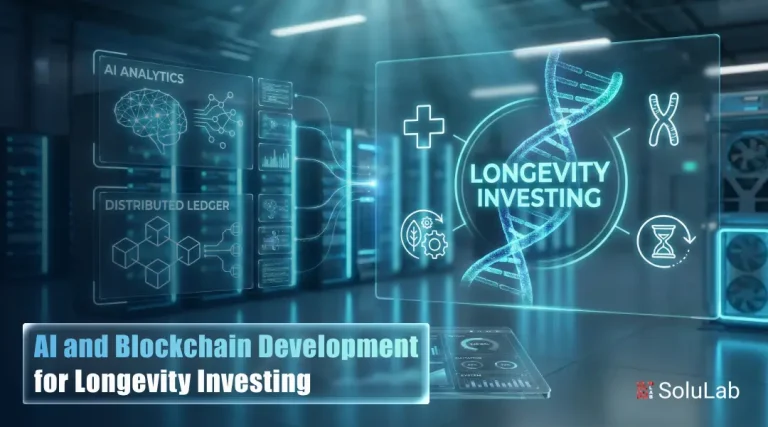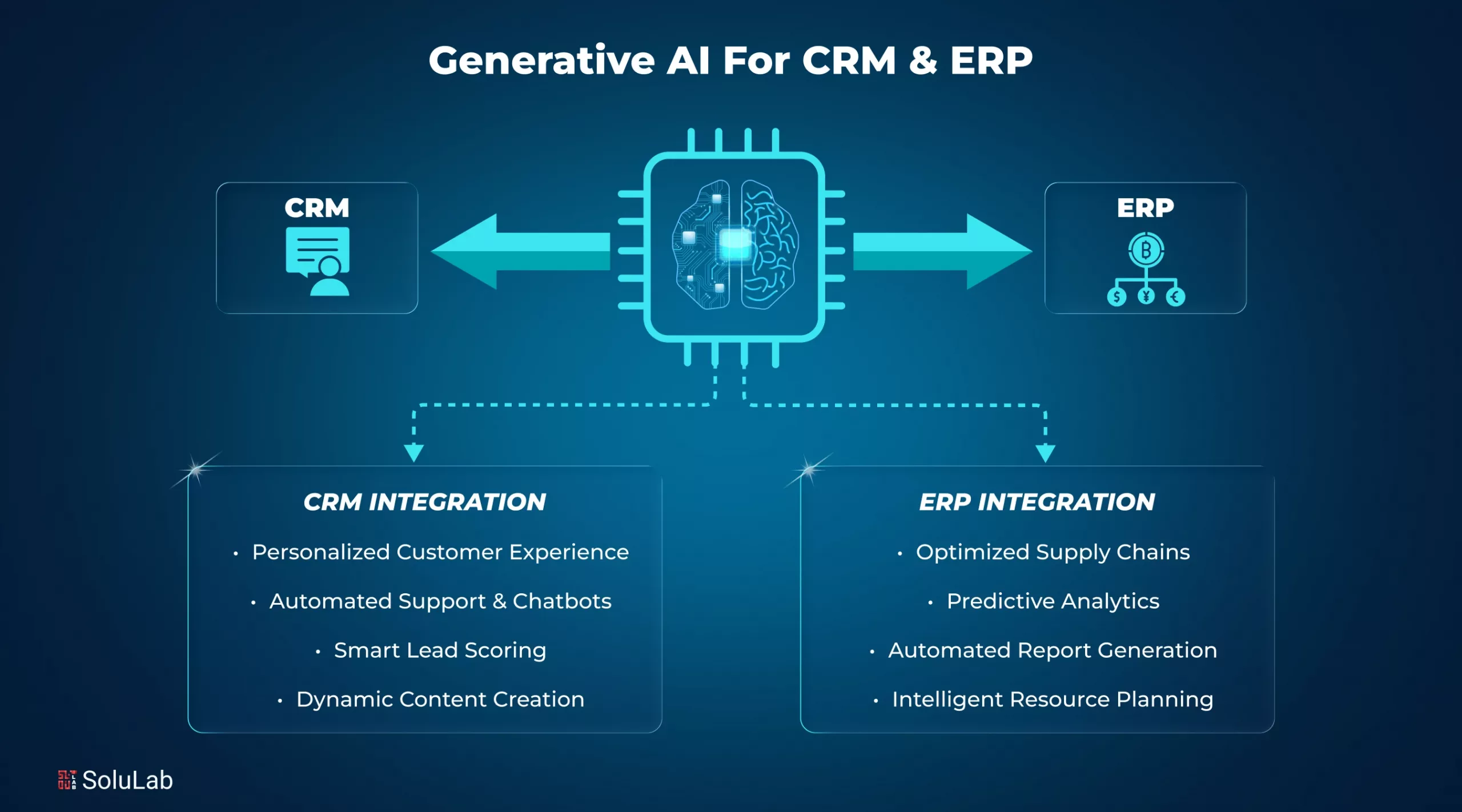
Every business collects mountains of data daily, yet most CRM and ERP systems struggle to turn it into actionable insights. Sales teams chase leads blindly, operations run on outdated forecasts, and customer service often feels reactive rather than proactive.
Generative AI can analyze such vast datasets, generate smart recommendations, automate repetitive tasks, and even draft reports or personalized messages. By integrating generative AI with your CRM and ERP, companies can unlock smarter workflows, faster decisions, and enhanced customer experiences, transforming the way business operates in the digital age.
According to recent McKinsey research, generative AI could increase sales productivity by 3 to 5 percent globally.
This blog will highlight the ways gen AI integration in your CRM and ERP can help your business, along with the process. Let’s get started!
How Generative AI is Transforming CRM?
With the implementation of generative AI, your CRM can do more than just store customer data; it can draft emails, generate reports, and even predict what your clients need next, all automatically.
Platforms like Salesforce, HubSpot, and Microsoft Dynamics 365 are now supporting enterprise CRM AI integration, making it easier for businesses to scale personalized interactions and improve operational efficiency.
Companies that implement generative AI report significant gains:
Gartner predicts AI-driven CRM adoption will influence over 70% of marketing software investments by 2027, with measurable improvements in lead scoring, sales productivity, and customer engagement.
For businesses, integrating AI-powered CRM solutions isn’t just a tech upgrade; it’s a way to stay competitive, make smarter decisions, and create better experiences for every customer.
Benefits of Using Generative AI in CRM

Businesses are exploring various Generative AI use cases in CRM, from automated email generation to predictive lead scoring, to drive better engagement and operational efficiency.
-
Automates Routine CRM Tasks
One of the biggest advantages of Generative AI implementation services is automation. Sales and marketing teams no longer need to spend hours drafting emails, creating reports, or scoring leads manually.
With AI-powered CRM solutions, workflows can automatically prioritize leads, send personalized follow-ups, and even generate proposals. Many businesses report saving up to 50% of manual effort when using these tools, freeing teams to focus on strategy and growth.
-
Enhances Personalization in CRM
Generative AI analyzes customer behavior and historical data to recommend products, customize marketing campaigns, and send timely communications. This advanced personalization helps increase engagement, loyalty, and conversion rates. Clearly, the benefits of implementing generative AI go beyond efficiency; they directly impact revenue and customer satisfaction.
-
Predictive Customer Insights
Predictive analytics powered by GenAI can identify customers at risk of churn, evaluate lead quality, and forecast future needs. The integration process of generative AI ensures these insights are fully connected to your CRM workflows, allowing teams to act proactively and retain more customers.
-
Improving Customer Experience
AI chatbots and virtual assistants enhance customer interactions by providing instant, accurate responses. Through generative AI CRM integration, businesses can resolve inquiries faster, reduce wait times, and improve overall satisfaction. The result is a smoother, more efficient experience for both customers and teams.
-
Boosting Efficiency and ROI
Enterprises using GenAI see measurable improvements in productivity, sales performance, and customer engagement. This proves the tangible benefits of AI-powered CRM for enterprises: better efficiency, higher ROI, and a competitive advantage.
Step-by-Step Guide to Integrating Generative AI with CRM
Integrating generative AI into your CRM or ERP system doesn’t have to be overwhelming. By focusing on ERP optimization and following these steps, businesses can ensure a smooth implementation while maximizing ROI:
1. Assess Your CRM Needs and Readiness
Before implementing GenAI, evaluate your CRM setup. Check data quality, adoption levels, and current workflows. Identify areas where AI can bring value, such as automating reporting, lead scoring, or customer communication. This assessment is crucial for the successful implementation of generative AI, ensuring that the integration delivers tangible results and aligns with business objectives.
2. Choose the Right Generative AI Models and Tools
Select AI models that align with your business needs, such as OpenAI GPT, Google Bard, or proprietary solutions like Salesforce Einstein GPT. Make sure the platform supports easy API connections so your CRM can smoothly integrate with AI. This step is crucial for successful generative AI CRM integration.
3. Prepare Your CRM Data for GenAI
Good data is the backbone of AI success. Make sure your CRM data is clean, structured, and compliant with privacy rules like GDPR or CCPA. Accurate data ensures that AI can deliver reliable predictions and recommendations. A well-organized dataset is key to the integration process of generative AI.
4. Implement Generative AI in Your CRM
Select the integration approach for your platform. Decide how AI will connect to your existing systems:
- APIs: Connect your AI model to CRM/ERP software via secure API endpoints.
- Native Plugins: Use built-in AI plugins available for platforms like Salesforce or HubSpot.
- Third-Party Middleware: Integrate through middleware platforms that act as bridges between AI models and enterprise software.
5. Testing and Deployment
Start small with pilot projects to check accuracy and gather user feedback. Look out for biases or errors and correct them early. Train your teams properly to ensure smooth adoption and effective Generative AI integration services.
6. Monitoring and Optimization
Keep track of key metrics like response time, lead conversion, and ROI. Continuous monitoring and fine-tuning of AI models help your CRM stay efficient and deliver better results. This is critical for effective generative AI integration.
Read Also: Enterprise AI Across Different Industries
Best Practices for Successful GenAI Integration in CRM
- Prioritize Data Quality: Make sure your data is clean and relevant. Good input leads to accurate AI outputs.
- Ensure Security and Compliance: Protect customer data and follow AI regulations. Use secure models and consent management.
- Invest in Training: Teach teams how to use AI ethically and effectively to get the most from Generative AI implementation.
- Maintain Human Oversight: Always have humans review important AI-generated content or decisions. Tools like the Crisp AI chatbot enable you to hand complex queries over to human agents.
- Leverage Industry-Specific Tools: Choose AI tools that fit your industry for better results.
- Adopt Ethical AI Practices: Use diverse datasets and perform regular audits to prevent bias.
Following these steps ensures that Generative AI integration solutions deliver maximum value.
Case Studies and Real-World Examples of GenAI in CRM
According to Forrester research, AI-powered CRM solutions will dominate marketing software spending by 2027.
Integrating Generative AI CRM solutions is not just theoretical; many leading companies have already seen measurable results. Here are some examples that show how generative AI implementation drives efficiency and productivity in real-world CRM scenarios:
-
Salesforce Einstein GPT
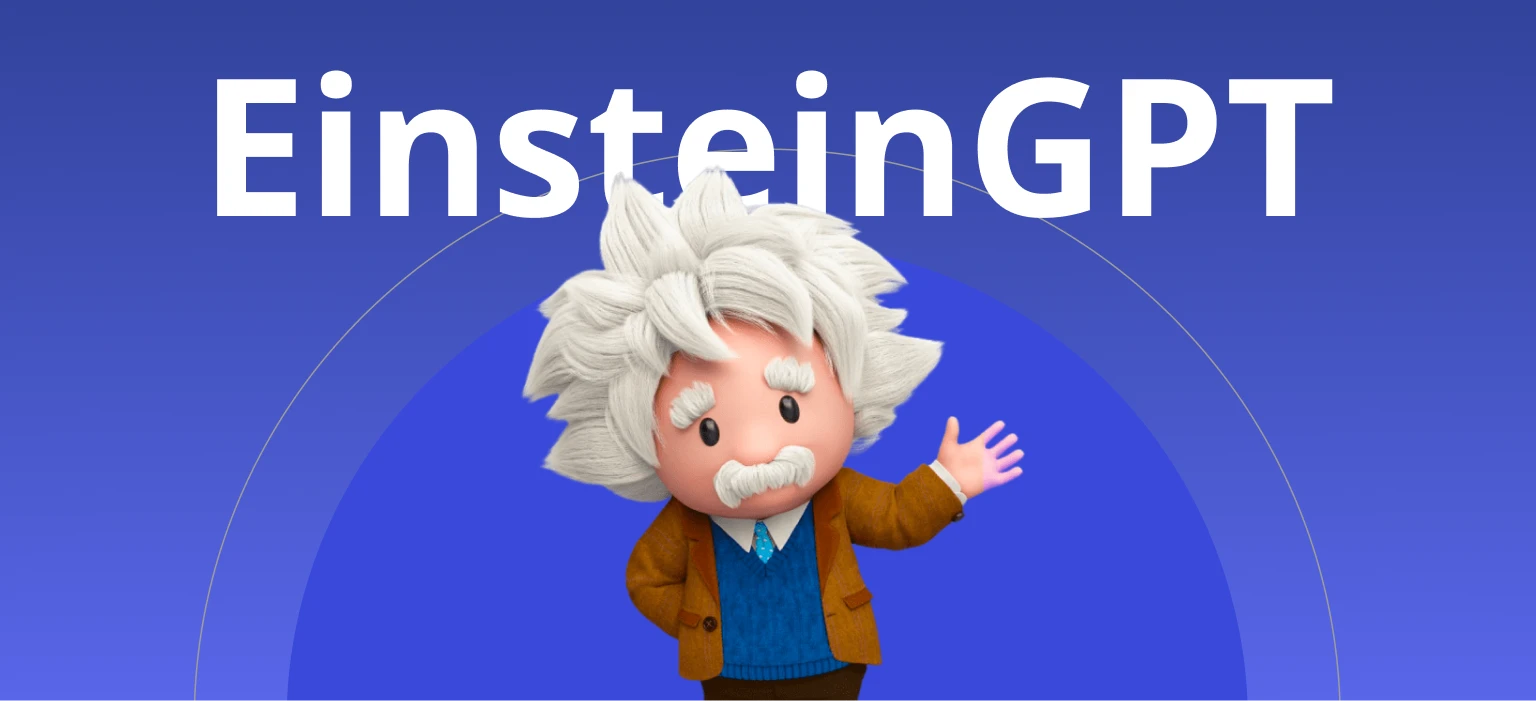
Salesforce’s Einstein GPT uses AI to create personalized content for sales and customer service teams. This means emails, proposals, and follow-ups can be automatically tailored for each client. For example, Citi uses Einstein GPT to generate insights from customer data and improve workflow efficiency, allowing teams to focus on high-value tasks instead of manual reporting. This highlights the benefits of implementing generative AI in large enterprises.
-
HubSpot Breeze AI
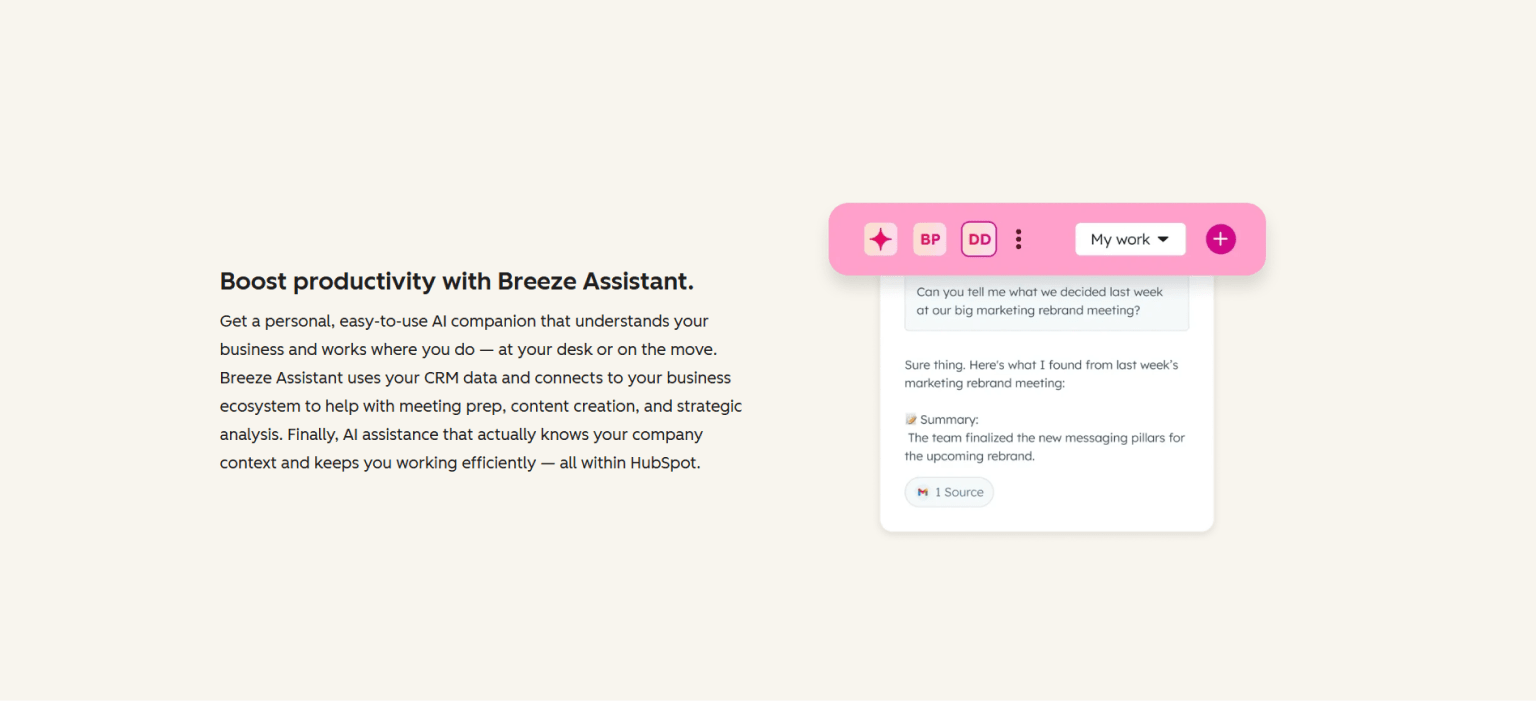
HubSpot’s Breeze AI automates marketing campaigns and content creation. Teams can quickly generate email drafts, social posts, and other marketing materials without starting from scratch. Companies using Breeze AI report up to 98% improvement in workflow efficiency, showing how AI-powered CRM solutions can save time and boost team productivity.
-
Microsoft Dynamics 365 Copilot
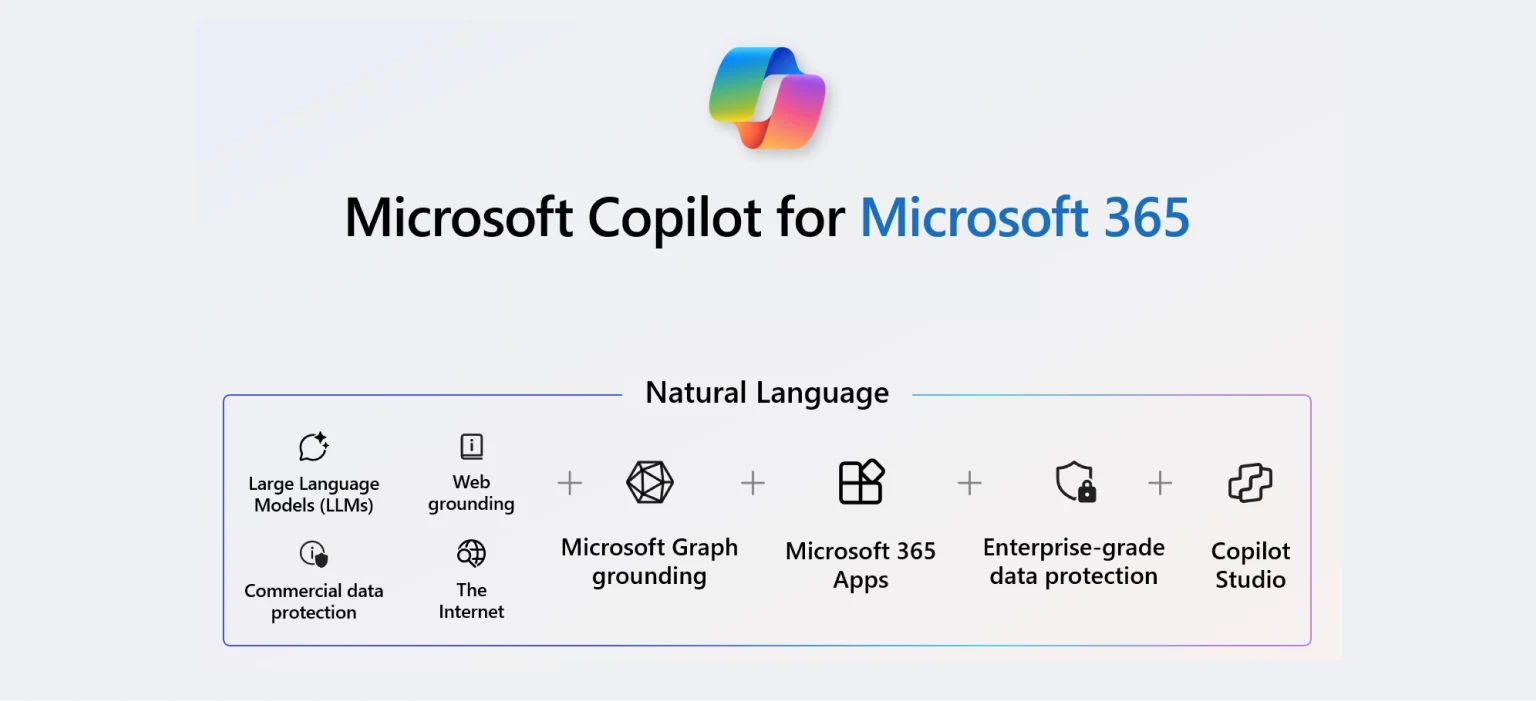
Microsoft Copilot integrates with Dynamics 365 to improve emails, meeting preparation, and CRM insights for sales teams. Summarizing customer interactions and suggesting next steps helps teams respond faster and make data-driven decisions. This is a clear example of how enterprise CRM AI integration can improve daily operations and customer engagement.
Tools and Platforms for Integrating Generative AI with CRM
When selecting models, consider the different applications of Generative AI that fit your industry, such as chatbots, content automation, or customer behavior prediction
- Vendor-Specific: Salesforce Einstein GPT, HubSpot Breeze, Microsoft Copilot, Creatio GenCRM
- General Tools: OpenAI APIs, Google Bard, IBM Watson
- No-Code Options: Make.com, Composio AI SDR Kit
- Open-Source Solutions: LangChain, CrewAI
Conclusion
Integrating GenAI into your CRM transforms how businesses manage customers. By automating tasks, personalizing communications, predicting behaviors, and streamlining workflows, companies can boost productivity and customer satisfaction.
SoluLab, a leading Generative AI development company, with expertise in GPT-based models, predictive analytics, and workflow automation, helps businesses seamlessly integrate AI. We ensure our custom-made solutions render the best scalability, data security, and measurable results.
Contact us for transforming your enterprise software into an intelligent, future-ready system!
FAQs
1. How can Generative AI implementation transform CRM operations?
Through Generative AI integration, CRM systems can automate tasks like drafting emails, generating reports, and scoring leads. This reduces manual work, enables predictive insights, and allows sales and marketing teams to focus on high-value activities, resulting in faster deal cycles and improved customer retention.
2. What are the benefits of implementing generative AI in business processes?
The benefits of implementing generative AI include operational efficiency, enhanced personalization, predictive insights, and smarter decision-making. Businesses see higher engagement, faster response times, and more accurate forecasting, all of which can directly impact revenue growth and customer satisfaction.
3. How does generative AI CRM integration enhance customer experience?
Generative AI CRM integration allows systems to automatically respond to inquiries, predict customer needs, and suggest personalized content. Teams can reduce response times, increase conversion rates, and provide a seamless experience, turning routine interactions into opportunities for engagement and loyalty.
4. How does enterprise CRM AI integration differ from traditional CRM upgrades?
Enterprise CRM AI integration embeds AI directly into CRM workflows, enabling real-time decision-making and predictive capabilities. Unlike standard CRM updates, it allows companies to automate complex processes, generate insights from large datasets, and scale personalized interactions across thousands of customers.
5. What is the cost of integrating generative AI with CRM?
The cost of integrating generative AI with CRM depends on the scale, tools, and complexity of your setup. While enterprise investment can be significant, the ROI often justifies it through efficiency gains, improved sales performance, higher customer satisfaction, and better data-driven decisions. Strategic planning and phased implementation reduce risk while maximizing value.




